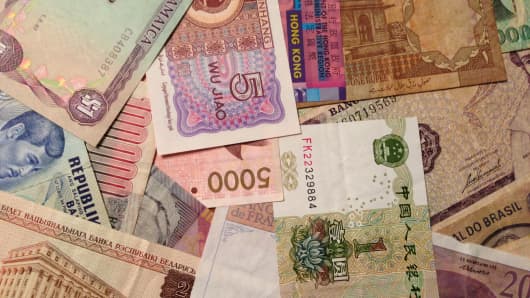The recent crash in emerging market currencies may fool investors into thinking now is a good time to invest, but HSBC has warned the currencies could suffer further falls.
"Do not buy an emerging market currency simply because it is cheap. It can become cheaper still," David Bloom, HSBC's Global Head of FX Strategy said in a note on Friday.
Federal Reserve Chairman Ben Bernanke triggered a steep drop in emerging market assets in May when he first signaled the bank would start reducing the amount of financial assets it buys in the markets. Investors cut their exposure to riskier assets and started selling off emerging market assets.
Last month, the Indian rupee touched an all-time low. Other currencies have also tumbled, including the Indonesian rupiah, the Brazilian real, the South African rand and the Turkish lira.
(Read more:RBI's Rajan takes a deep dive to save the rupee)
Bloom warned against reading too much into recent positive data from China China's industrial production gained traction in August, according to data this week.
"While valuation will be an element of any currency's outlook, buying battered EM (emerging market) FX (currencies) requires a fundamental rational above and beyond the issue of cheapness," he said.
Some emerging market currencies are better placed than others, according to HSBC. The Korean won is insulated from the worst and will outperform its Asian emerging market peers thanks to a large current account surplus and the re-emergence of capital inflows, the bank argued.
Patient investors could look to a stronger South African rand, and Turkish lira, according to HSBC.
The bank remains most concerned about the Indian rupee, which "has only inched into undervaluation territory". The Indonesian rupiah is even more worrying and still overvalued, it said.



